Overview of Corporate Governance Issues for Co-operatives - IFC
Overview of Corporate Governance Issues for Co-operatives - IFC
Overview of Corporate Governance Issues for Co-operatives - IFC
You also want an ePaper? Increase the reach of your titles
YUMPU automatically turns print PDFs into web optimized ePapers that Google loves.
The first model is typical <strong>of</strong> the British-derived tradition and is based on a singleco-operative system underpinned by a common legal <strong>for</strong>m. This involves primary andsecondary societies with a single apex body. The sector is controlled by a governmentdepartment which is headed up by a Registrar with considerable powers and functions.By contrast, the French-developed co-<strong>operatives</strong> as one <strong>of</strong> several rural institutions <strong>for</strong>development alongside mutuals, associations and trusts. Starting with Native ProvidentSocieties, these semi-public institutions had compulsory membership and werecontrolled by civil servants. Over time they evolved into mutual societies <strong>for</strong> ruraldevelopment but remained centrally orchestrated.A third tradition is linked to social movements and was embedded in central Africa bythe Belgians. Here co-<strong>operatives</strong> are linked to a lead social movement agency such asa trade union, women’s association or farmer’s organisation, with the co-operative beingviewed as an instrument <strong>of</strong> collective action.A fourth tradition situates co-<strong>operatives</strong> as vehicles primarily <strong>for</strong> agricultural producersto help their social development and is rooted in the Portuguese cooperative systems.Finally, some co-operative traditions have been ‘home-grown’ within countries such asEthiopia, with only a limited experience <strong>of</strong> colonisation.The researchers argue that these different models are now merging and that thestrength <strong>of</strong> the unified model is fading. Instead, trade based federations are emergingas part <strong>of</strong> a broader social economy sector. The need <strong>for</strong> developing best practiceexamples in governance is identified as a priority. As yet there is no analysis <strong>of</strong> thegovernance implications within each <strong>of</strong> these models. Some key questions emerge: Is itpossible to develop a set <strong>of</strong> shared corporate governance standards applicable acrossall types <strong>of</strong> co-operative? How does the role <strong>of</strong> elected boards vary? Un<strong>for</strong>tunately theresearch raises but does not answer these and related questions.The study reveals that government involvement in the co-operative sector is slowlyreducing but remains inconsistent and erratic. It ranges from no interference andsupport at all <strong>for</strong> co-<strong>operatives</strong> in Cape Verde and Uganda to high levels <strong>of</strong> directionand interference in Nigeria and Egypt. Legislative liberalization is recent or current inSouth Africa, Ghana, Kenya and Rwanda. Kenya provides an example <strong>of</strong> aliberalisation process partially rescinded when co-<strong>operatives</strong> proved themselves illprepared <strong>for</strong> the new era and the withdrawal <strong>of</strong> government regulatory powers in 1997.The results were largely negative with corruption and mismanagement all too common,including failure to hold elections, illicit payments, theft etc., so much so that thegovernment intervened in 2004 with a new Act which reintroduced state regulationthrough the <strong>of</strong>fice <strong>of</strong> the <strong>Co</strong>mmissioner <strong>for</strong> <strong>Co</strong>-operative Development (Wanyama2006). In Uganda the complete withdrawal <strong>of</strong> state support and regulation in 1991 alsohad negative consequences <strong>for</strong> the co-operative sector which was similarly unprepared<strong>for</strong> the new era, also resulting in large scale mismanagement, corruption, theft etc. As aresult in Uganda, a large number <strong>of</strong> co-<strong>operatives</strong> collapsed as, unlike Kenya, thegovernment did not re-engage with the sector (Mrema 2006). The co-operativePage 20


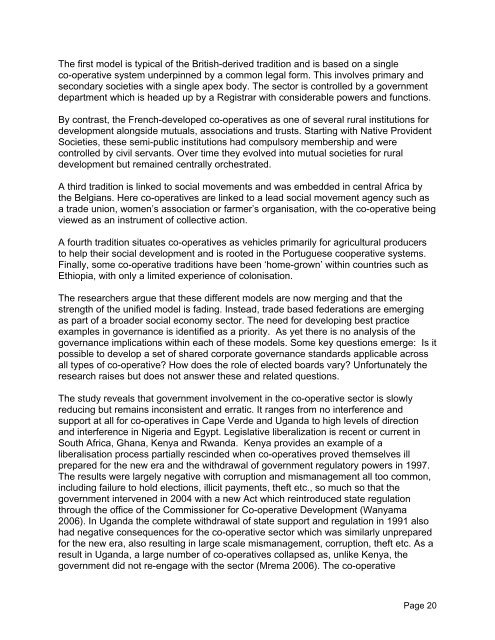
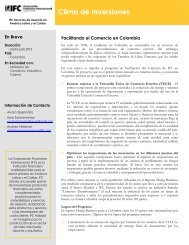
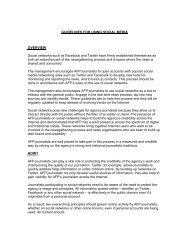
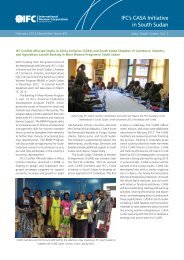
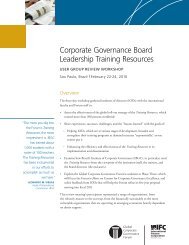

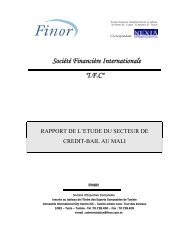


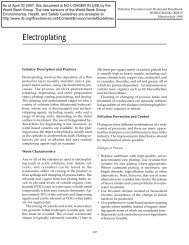

![Print a two-page fact sheet on this project [PDF] - IFC](https://img.yumpu.com/43449799/1/190x245/print-a-two-page-fact-sheet-on-this-project-pdf-ifc.jpg?quality=85)


